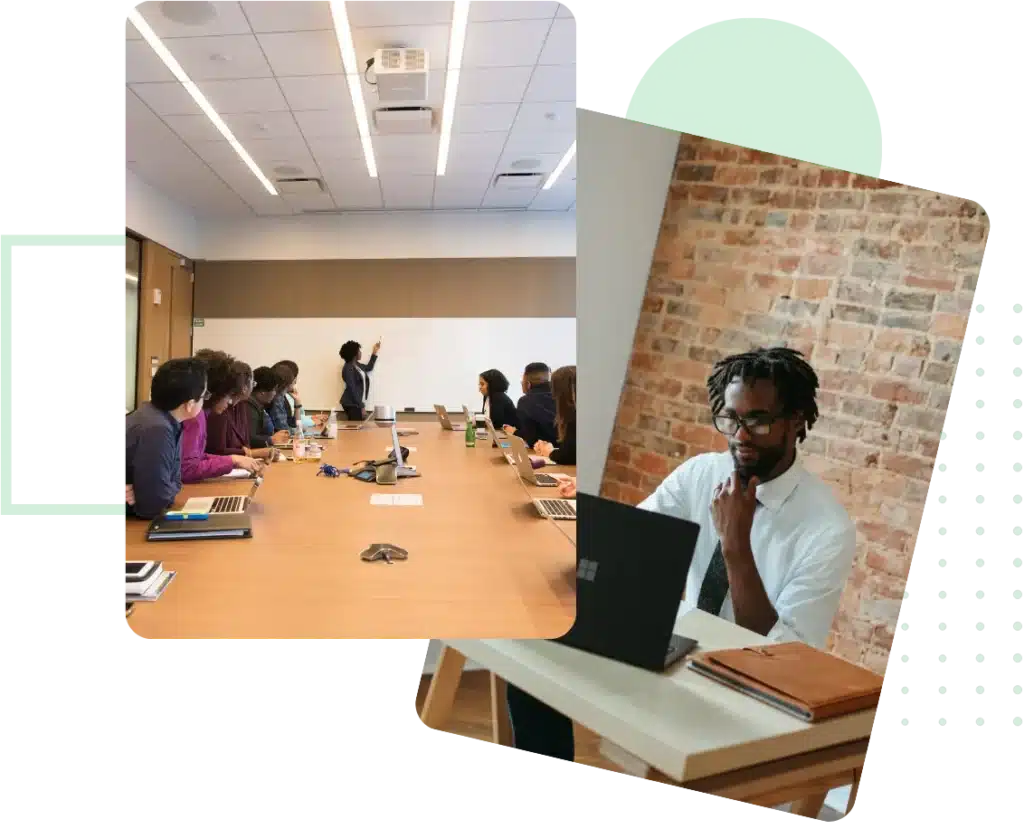Les compétences humaines au coeur de
LA RELATION CLIENT
Cette formation vous permettra de développer votre empathie, votre agilité et votre adaptabilité pour améliorer la relation client. Vous saurez mieux écouter pour être plus orienté client.

DÉCOUVREZ NOTRE FORMATION
Objectifs
- Comprendre comment active les compétences humaines dans l'activité professionnelle afin de développer la confiance en soir et l'échange de ses collaborateurs
- Apprendre à impliquer ses équipes dans la relation client pour augmenter le taux de transformation et la satisfaction client
Inter
Dates de la prochaine formation planifiée
– 19/09/24 de 10h a 12h
– 26/09/24 de 10h à 12h
– 03/10/24 de 10h à 12h
– 10/10/24 de 10h à 12h
– 17/10/24 de 10h à 12h

Contenu
- 5 sessions visio de 2 heures ou 2 jours en présentiel
- 3 heures via des capsules e-learning avant chaque session
Délai d’accès à la formation : La formation peut démarrer 8 jours après la signature de la convention ou réception de l’accord de prise en charge OPCO.
Avis clients*
4,4/5 (1055 avis)
Taux de réussite*
100%
* Ces indicateurs sont mis à jour chaque année à partir des éléments consolidés des années précédentes.
Source des indicateurs : Liste des apprenants formés/quizz de validation des acquis/évaluation de la formation
Dernière date d’actualisation des chiffres : 15/05/2024










Programme
Déroulé de la formation
L'empathie
- Le carnet de bord de l’attention
- L’échelle de l’empathie
Activités pratiques :
- Auto-diagnostic des compétences par l’appli emage-me
L'intelligence émotionnelle
- La roue des émotions
- La Triade de Tony Robbins
Activités pratiques :
- Mime d’émotion
- Observation d’une situation qui génère une émotion et complétion de la roue des émotions
L'adaptabilité
- L’appel aux multiples formes d’intelligence
- La bascule vers le mode adaptatif
Activités pratiques :
- Mise en pratique autour d’un problème identifié : quelle réaction ? analyse de la réaction ?
L'écoute
- Les 7 facteurs clés de l’écoute
- Les outils du dialogue
Activités pratiques :
- Analyse de son niveau d’écoute par rapport à une situation vécue
- En déduire un point à mettre en place suite à la session de formation
L'assertivité
- Les clés pour développer l’assertivité
- Les droits à soi-même
Après la formation
- Questionnaire de validation des acquis

Avant chaque session
Les participants réalisent le e-learning correspondant.

Pendant la session
Le formateur anime avec quizz, exercices individuels ou collaboratifs, challenges, mises en situations.

Après chaque session
Les participants ont des exercices de mise en application dans leur contexte.
MODALITÉS DE LA FORMATION
Public
Commerciaux, Business developers, Technico-commerciaux, Consultants, Managers Commerciaux.
Toutes nos formations sont accessibles aux personnes en situation de handicap. Contactez-nous pour un accompagnement spécifique et adapté à vos besoins.
Prérequis
Un questionnaire de positionnement est envoyé avant le début de la formation pour évaluer le niveau avant l’entrée en formation.
Evaluation
À l’issue de la formation, un questionnaire de validation des acquis sera remis aux participants afin d’établir le niveau d’atteinte des objectifs de la formation.
Le résultat de ce questionnaire sera restitué au client en fin de formation, au cours d’un rendez-vous de suivi post formation (débriefing).
DE NOMBREUSES FORMATIONS DISPONIBLES
Découvrez également
Formation pour améliorer la gestion des situations difficiles en relation client afin d’aborder ces situations comme un moyen de valoriser l’image de l’entreprise.
Formation pour acquérir la posture “coach”, faire des objectifs un outil de pilotage et de management et mener des entretiens motivants et efficaces.



